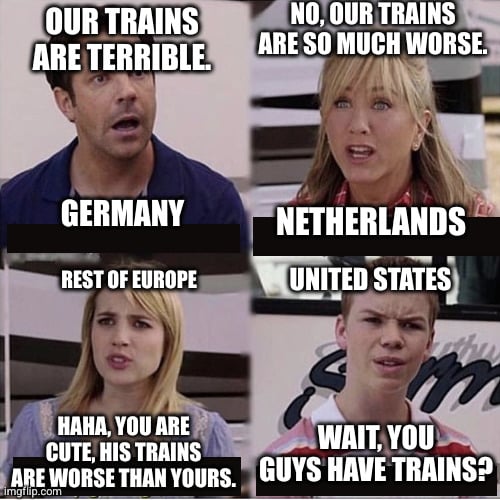- cross-posted to:
- world@lemmy.world
- cross-posted to:
- world@lemmy.world
deleted by creator
The saying “Die Deutsche Bahn hat 4 Feinde - Frühling, Sommer, Herbst und Winter” (transl: “The German railway has 4 enemies - spring, summer, autumn and winter”) is fitting once again. Before the infrastructure was cut back, the motto was: “Alle reden vom Wetter - wir nicht” (“everyone is talking about the weather - we’re not”): https://yewtu.be/watch?v=wvJAAzfK3Rk
The German railway has 4 enemies: Audi, BWM, Mercedes, VW
That sounds about right.
The Hungarian Railways has nearly the same thing: “The Hungarian State Railways has 5 enemies - the four seasons and the passengers”
It’s because after privatization the DB (Deutsche Bahn) figured out that neglecting their infrastructure until it causes a crisis, causing the government to step in and pay for repairs is much cheaper (for them) than maintaining it properly in the first place.
Seriously, fuck the DB.Fuck the idiots that had the idea that the DB should be run like a private profitoriented company. Nurture, embrace, rebuild and improve the DB.
But the first few people that could say that their quaterly numbers were so much better argued that their quaterly numbers were so much better! How could you argue with capitalism?
I read somewhere that they prioritised cargo trains over passenger trains anyway when it comes to delays and service reliability.
Besides, what else? There is only one railway network and you gotta use it anyway no matter how trashy it gets.
They don’t even need to compete for passengers.
I think passenger trains generally have priority over cargo, but on the main “paths” they have a separate set of rails anyway.
Are you seriously arguing that infrastructure shouldn’t be privatised while usage of said infrastructure could very well be?
Butterfly meme: is this socialism?
Yes.
As an example, let me introduce you to the concept of: roadways.And even then, I don’t know if a public service like public transportation should even be entirely private.
It’s not just the railway. Munich Airport canceled all flights because of an ice storm. Roads throughout Bavaria are blocked due to fallen trees as well as snow/ice that hasn’t been removed yet.
Bavaria’s infrastructure as a whole clearly isnt prepared to deal with such weather events.
That’s why their minister is hoping for climate change with higher temperatures :)
Unfortunately these events might even be connected to climate change. Higher temperatures allow for more humidity in the air leading to increased rain an snow fall. See also heavy rainfalls in Africa.
deleted by creator
Last I checked there were also some important connections that had been damaged by trucks this year, e.g. the one in Frankfurt between the south and the main station.
Well, since misery loves company, i feel a bit better about the Netherlands now. Our railways have sucked for ages. But its good to see its not just ours :)
I’m sorry, what? It may feel like they suck when there is a 10 minute delay on the train you wanted to take, but the Dutch railway system is one of the most reliable in Europe.
There is this one YT Series “Jet Lag” where three guys play catch in Europe using Trains. It’s a lot of planning, checking what the travel options of the hunted one are, which trains he might take etc. It’s a game of strategy, until they arrive in Germany at which point it litteraly becomes a clusterfuck of random trains.

We’re not talking ten minute delays 😂 if only it was that good!
No. Ever since COVID came around things have gone down hill. And as a Dutch man who travels by train a lot, i can say in al honesty, reliable is not what i would call it.
And as i am typing this im in a train thats filled from top to bottom because the train before this one failed. So we’re having twice as many people in the train. And oh, there’s a whole bunch of trains that can’t move because power failures someone down the line.
10 minutes you say… 😂😂😂 well at least you made me smile :)
Dude. We had a friend on holiday in northern Germany who wanted to visit us in Maastricht. Even though she was in fucking Germany, it was twice as fast to get to the border, take a bus to Groningen and then cross the Netherlands than to use the DB to Aachen.
Another thing. The Dutch trains that are known to have many transfer passengers stop on the same platform, so you only need to cross the platform. In Germany your train arrives on Gleis 5, your next train on Gleis 16. Oh no, 13. Woops we changed it again haha.
You are right it went downhill, but DB is on another level of skullfuckery.
As a fellow dutch person that also travels by trains a lot, I get really irritated when people only complain. Sure, there are definitely fuck ups at NS. But I feel people completely write off the system because of them. I can’t remember the last time a train got outright cancelled (outside of extreme weather conditions in which I also wouldn’t be comfortable driving). There are issues with the system, those should be fixed, but that does not mean that everything is terrible.
But maybe it’s way worse in your part of the country, there definitely have been issues with getting enough personnel (as do all other sectors). So maybe we are both making our arguments from two different experiences.
I travel across the country. And trains Do get outright cancelled, especially if they are late.
But i feel mostly our government is to blame. With their half assed rules and regulations.
Bruh, your railways are like a million times better than the Deutsche Bahn! I always enjoy taking the OV whenever I’m in that beautiful country of your’s.
Well, dont tell my boss. Our railway’s shitshow means the company pays for my drivers license 😂
The underinvestment in numbers: (Investment per Capita in Rail Infrastructure in €)

Euros per capita, because Euro per rail-km was too on point for maintenance costs for this lobby group. These numbers don’t even compare, with changes in median income each of these euros can buy different amounts of maintenance. Bad, misleading statistics.
I don’t see why Euros per Rail Kilometre would be a better statistic. But I’m open to learn, could you please elaborate why you think the other measure would be better? For the other point, Wages in Western Europe don’t differ hugely (with Switzerland and Luxembourg being the exception)
It would at least be connected to one factor that needs to be normalized for this comparison. The problem is, different countries have different rail density, population density and wealth density levels and if you really want to compare how much ‘value’ is put into rails, you need to weigh that stuff in. That was just the first ‘fix’ that came to mind, but you are right, the full normalization would be more complex. That Luxemburg, a small urban country with high gdp/capita is leading this list, seems completely reasonable, and nothing France or Germany with their wide countryside and poorer urban areas should aspire to catch up to. Disposable income differences: https://ec.europa.eu/eurostat/statistics-explained/index.php?title=Living_conditions_in_Europe_-_income_distribution_and_income_inequality#Income_distribution GDP per capita differences: https://ec.europa.eu/eurostat/statistics-explained/index.php?title=GDP_per_capita,_consumption_per_capita_and_price_level_indices
I would say although, that less rail density in areas with comparable population density means underinvestment to me. Also what factor does Wealth Density play? Why shouldn’t poor Regions get Rail Infrastructure?
Every region should build the public transit it needs and can afford. The most boring, proven transit won’t win beauty or speed awards or attract tourists but gets people cheaply from A to B and boosts the economy. To build a high speed connection, you have a certain economic start-threshold where the investment amplifies the economic output enough to benefit the region and not suffocate it in debt before it can flourish. So I’d expect more high speed rail between economically well faring regions, which increases the ‘euro per person’ but could be the same or less spending relative to gdp or avg. income.
Equality discussion aside: the spending discussion needs to be split in maintenance and expansion. Regions with currently more rail should be spending more on maintenance than those with less. Underinvestment in this area means decay, so to see decay of german rail compared to swiss rail, you need to compare how much they spend on maintenance, and normalize to account for differences in bridges, tunnels, high-speed, low-speed, single track, etc.
Expansion is a differrent beast, especially because the price decreases if you build steadily every year and economies of scale kick in. If only our polititians would get that… RMtransit made some good videos how to decrease the costs of transit expansion.
I never talked about high speed rail. I think most of the times it’s a huge cash sink (especially the 300km/h ones where you need a lot of tunnels and bridges) Maintaining the existing infrastructure so you could ride the planned speeds and avoid delays would be a huge win. If we look at Europe, the countries that don’t bet big on high speed have a dense network and more people riding Rail, and then the countries who’ve built a lot of High Speed Lines which sped up the connection between a few huge cities at the cost of all the middle cities in-between who have lost most of their rail services.
This is the best summary I could come up with:
Decades of underinvestment in the German railways have been blamed for chaos in parts of the country after heavy snow led to much of the network grinding to a halt.
Snowfall of up to half a metre in Bavaria, southern Germany, led to numerous breakdowns and prompted the cancellation of scores of trains, with signalling systems and electronic information boards frequently malfunctioning.
The head of the Railway and Transport Union, Martin Burkert, said DB was ill-equipped to deal with the weather as a result of years of underinvestment.
“The DB slogan ‘we travel in all weathers’ has lost its credibility,” he told the Augsburger Allgemeine newspaper, calling large parts of Germany’s rail infrastructure “creaking and dilapidated”.
The criticisms came on the back of figures published at the weekend, which showed that last month DB’s long-distance services fell to their least punctual level in eight years.
Partly to blame are extensive construction works being carried out across the network, a response to years of neglect of bridges, tracks and general infrastructure.
The original article contains 544 words, the summary contains 170 words. Saved 69%. I’m a bot and I’m open source!










